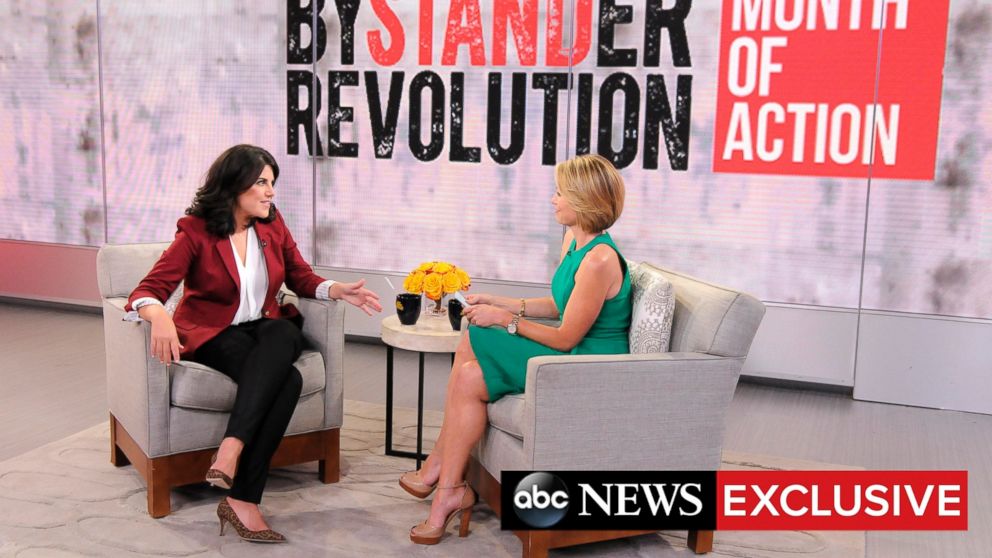Monica Lewinsky to Bullying Victims: ‘Please Don’t Suffer in Silence’
She is taking on a subject that’s deeply personal for her.

— -- Monica Lewinsky is taking on a subject that’s deeply personal for her: bullying.
Lewinsky lost her digital reputation in 1998 when her affair with President Bill Clinton made headlines around the world, fueling a constant barrage of jokes, insults and cyber-bullying.
Nearly 20 years later, Lewinsky is a contributing editor for Vanity Fair magazine and is embarking on a new job as strategic ambassador to Bystander Revolution, an anti-bullying organization.
With October being Bullying Prevention Month, the organization is rolling out 31 challenges – one for each day of the month – all designed to with the goal of getting people to change how they react when the see or encounter bullying, Lewinsky said.
“It's all about forming habits of action,” the 42-year-old said in an interview with “Good Morning America”’s Amy Robach that aired Wednesday. “So a little bit of kindness, a little bit of courage, a little bit of inclusion and we can really start to shift the culture and take the power out of bullying.”
When Robach asked Lewinsky why she was speaking publicly now, she replied: “It really was time.”
She added: “Imagine that you've gone through this horrific, life-changing experience and you were traumatized and humiliated and all of a sudden you realized one day that you could actually help other people because you had survived it. It would just be really hard to sit back and remain silent.”
When it comes to those who are bullied, Lewinsky said kindness has an impact.
“I can tell you from personal experience that it makes a difference,” she said. “It makes a difference if someone makes a, you know, unkind comment on social media and you have other people saying, ‘Hang in there,’ or something positive. I think it takes the sting out. “
Lewinsky has said not a day goes by that she doesn’t think about the mistake that she made. Robach asked Lewinsky how she was handling the fact that Hillary Clinton – Bill Clinton’s wife -- was again running for president and constantly in the news.
“You know, I think it's really wonderful that we have two women from both parties running for higher office,” she said, referring to Clinton in the Democratic Party and Carly Fiorina, who’s seeking the Republican Party’s nomination.
“However it may affect me personally is not something I'm going to talk about today,” she said.
Robach asked Lewinsky what life has been like for her.
“What's it like to walk into a job interview? What's it like to go on a date? What's it like to order a pizza when your name's Monica Lewinsky?” Robach asked.
“Well, that I usually use another name for …,” she said. “I've had my challenges over the years with those kinds of things. I think it is -- it's taken skill and a lot of help from incredible professionals to learn to manage not only my own trauma, but I also think to manage other people's expectations.”
Saying that everyone wants to feel proud of their name, Robach asked Lewinsky how she felt about her own name now.
“I'm grateful,” she said, adding: “I really think that I'm grateful to have this opportunity. And I'm -- even though I have suffered from shame, I'm not ashamed of who I am.”
Lewinsky was inspired to return to the public spotlight following the death of Tyler Clementi, an 18-year-old college student who killed himself after being watched via webcam as he kissed another man. Clementi’s death drew widespread attention to cyberbullying.
For Lewinsky -- who also thought about suicide and whose own mother feared she would take her own life -- Clementi’s story was a call to action.
Her mother was distraught over Clementi’s death, really “sobbing in a way that I don't hear my mom sob often … she kept saying, ‘Tyler's poor parents,’” Lewinsky recalled.
Her mother was reliving 1998, the days when she had to sit by her daughter’s bedside every night.
“She was worried about what I would do if I were left alone …,” Lewinsky said, “and that was sort of an intersection for me of a point where I was healing, but also to realize that there might be something, a way that I might be able to contribute. And I also want to say, Amy, too that I want to be really clear that I'm not equating my own experiences with Tyler's.”
After more than a decade of silence, Lewinsky has been talking more about her experiences. She wrote a 2014 essay in Vanity Fair essay about her affair with Bill Clinton, and gave a TED talk in which she referred to herself as the “Patient Zero” of Internet shaming.
Asked whether it gets easier each day to be back in the public eyes, Lewinsky said it was “different.”
“I think what's great is people used to come up to me and they would say, ‘No offense. But do you know who you look like?’ And now,” she said, laughing, “now I have people engaging with me about my Bystander Revolution work or the Vanity Fair essay, the TED talk … it's a different experience.”
For any bullied person who watches the interview, who feels the shame of being bullied either online or in person, Lewinsky has a message: “Please don’t suffer in silence.
“Please, I beg you find someone or an organization that you trust to turn to and to know that you can survive this. The Bystander Revolution website is a great place to start. And I wish it had been around 17 years ago,” she said.



